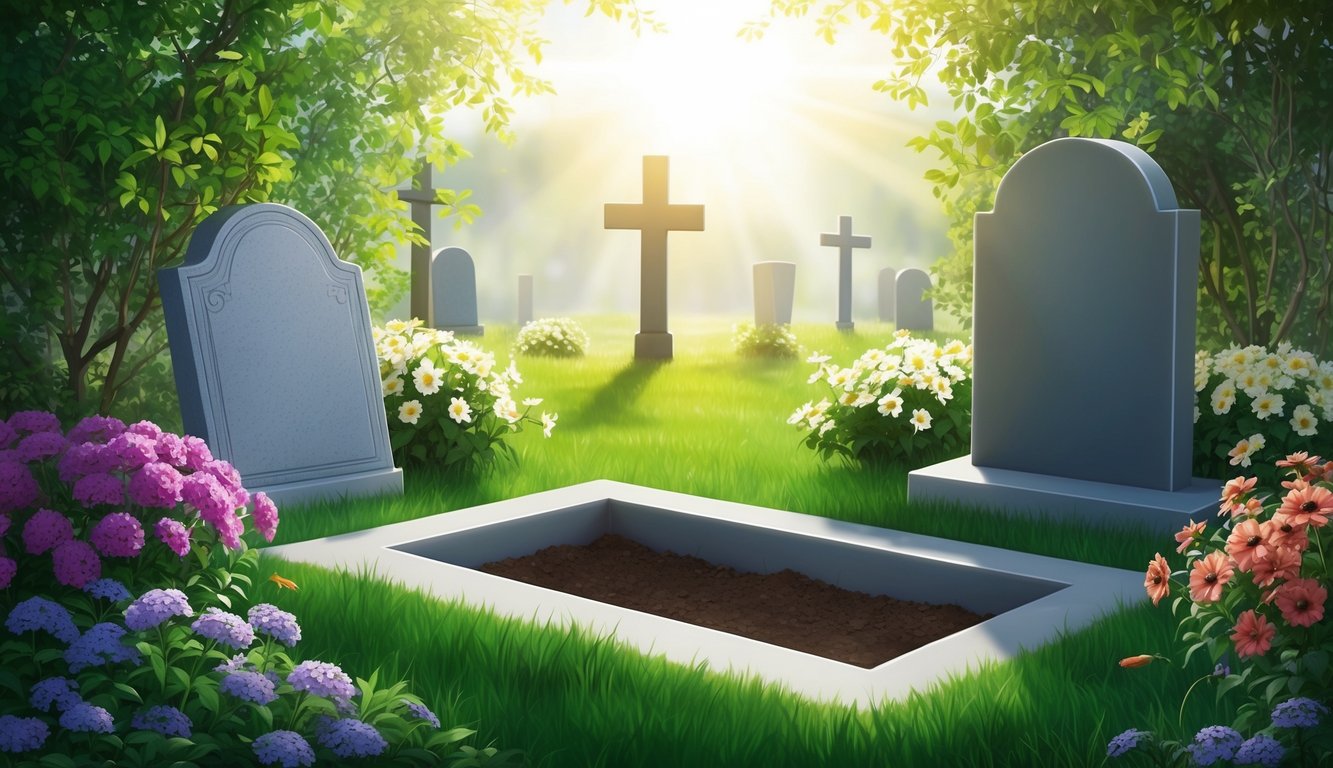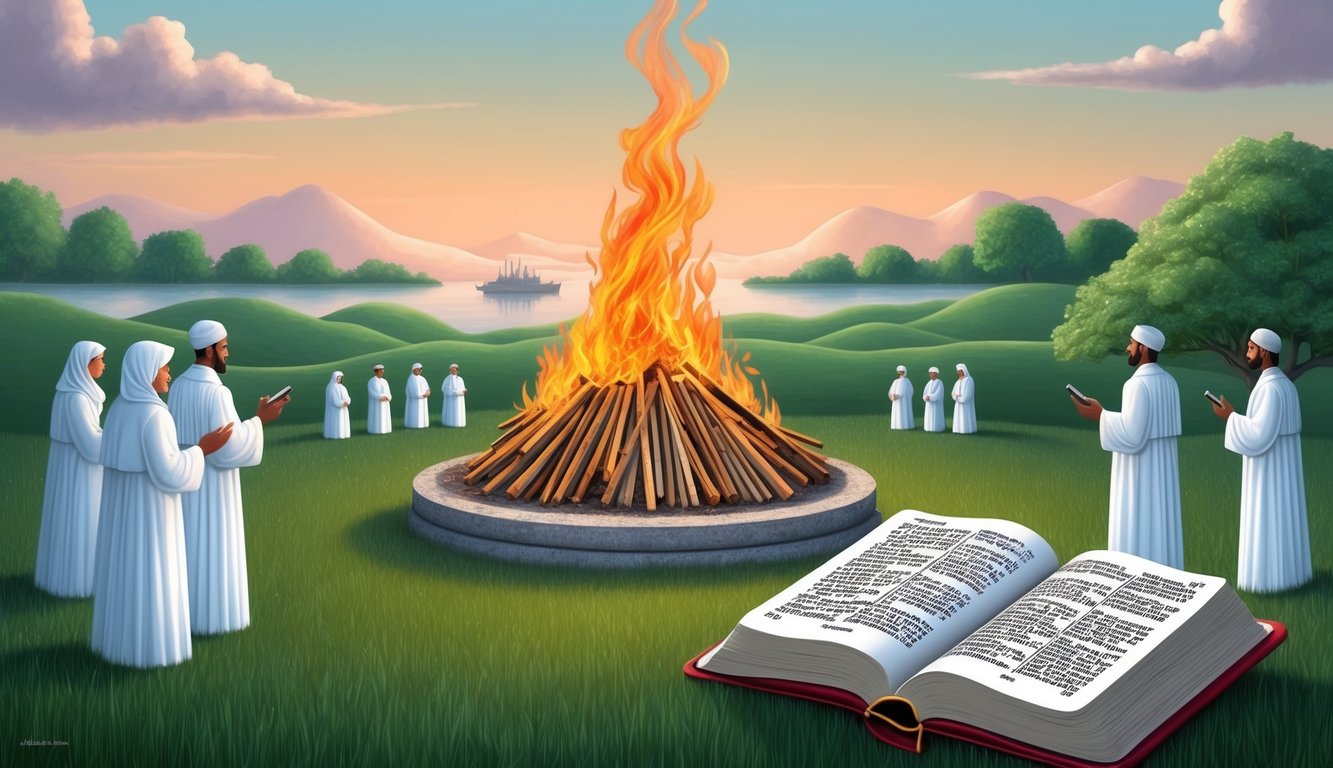Don’t Miss Out On This Unique Astrological Opportunity
Are you tired of spinning your wheels and getting nowhere? Simply put, you’re out of sync: you’re out of alignment with your astral configuration.
But: there’s a kind of map that can help you reclaim your alignment. Think of it as your own personal blueprint to success and happiness: a blueprint that will help you live your most amazing life.
Get started here.
When exploring what the Bible says about cremation, you may find yourself asking whether it’s a practice aligned with Christian beliefs.
The Bible does not explicitly forbid cremation, so many Christians interpret its teachings in various ways.
While some Christians point to the burial of Moses as a sign that burial is preferred, others believe cremation is a valid choice.
In ancient times, Greek and Roman cultures often practiced cremation, while people in the Biblical narrative generally avoided it.
This choice can create a divide, as some argue that traditional burial is more aligned with Christian values.
Today, the conversation continues as Christians consider cultural shifts and personal beliefs.
Understanding these perspectives might help you decide what feels right for you or your loved ones.
Whether you lean towards cremation or burial, your choice can align with Christian values.
Exploring these options allows a deeper reflection on what feels meaningful and respectful in honoring life and faith.
Biblical References to Death and Burial
The Bible offers several insights into how death and burial are addressed from both Old and New Testament perspectives.
You will find references to burial practices, the significance of the body’s return to dust, and the hope of eventual resurrection.
Old Testament Perspectives
In the Old Testament, burial is treated with respect and reverence.
Genesis 3:19 famously states, “For dust you are, and to dust you will return,” emphasizing the body’s return to the ground.
This idea is echoed in Ecclesiastes, which underscores the temporary nature of life.
Burial sites were often caves or the ground itself, signifying rest and peace.
In Joshua 7:25, Achan and his family were buried under a large pile of stones.
Similarly, Saul’s bones were buried under a tamarisk tree after being retrieved from the Philistines, as described in 1 Samuel 31:12.
Israelites viewed burial as a duty to honor the deceased, focusing on the return to dust and the soul’s journey.
This perspective set the groundwork for the hope of a future resurrection.
New Testament Insights
The New Testament shifts focus to the theme of resurrection, especially through the life and teachings of Jesus.
Burial still holds importance, as seen when Jesus was laid in a tomb following his crucifixion.
His resurrection on the third day, however, highlights the Christian hope in life after death.
Paul speaks in 1 Corinthians about the resurrection of the dead, providing a deeper theological understanding.
The body, like a seed planted in the ground, is perishable but raises imperishable.
The scriptures do not specifically prohibit or endorse cremation, leaving it largely to personal or cultural preferences.
For early Christians, burial remained the norm, rooted in tradition and the example of Jesus.
Cremation in Christian Practice
Cremation has been a topic of discussion among Christians, who often weigh historical practices against modern beliefs.
You’ll find insights into how it relates to Christian freedom and costs and what Catholic and other sects think.
Historical Context
In ancient times, burial was the norm among Christians.
The practice symbolized the belief in resurrection, and cremation was largely avoided due to its association with punishment among Greeks and Romans.
Early Christians saw burial as a way to honor the body, believing in its future resurrection.
As Christianity spread, burial maintained its importance.
The Catholic Church reinforced this approach, associating cremation with non-Christian beliefs.
Christians preferred funeral services that adhered to traditional burial rites.
Cremation was almost considered taboo, due to its perceived conflict with resurrection teachings.
Modern Christian Views
Today, views on cremation among Christians vary widely.
Many believers see it as a personal decision, reflective of Christian freedom.
Some denominations, such as Catholics, have relaxed their stance, allowing cremation while still preferring burial.
In the context of modern funerals, economic concerns also come into play.
The cost of cremation can be significantly lower than traditional burials, making it an attractive option for families.
While some still question, “Is cremation a sin?” most see it as a choice that reflects personal and family preferences without religious penalties.
The Hope of Resurrection

In Christianity, the hope of resurrection promises believers eternal life through Jesus.
It paints a picture of a transformed human body, filled with new life in Heaven.
Eternal Life and the Resurrected Body
The Bible teaches that after death, believers will be raised to eternal life.
This transformation involves receiving new bodies that are perfect and immortal, like the body of Jesus after His resurrection.
Philippians 3:21 states that Jesus will transform our lowly bodies to be like His glorious body.
This idea brings comfort, assuring that the faithful will share in the resurrection of life and spend eternity with God and angels.
Symbolism of Burial and Resurrection
Burial is seen as a symbol of planting a seed, reflecting faith in the resurrection.
When you bury a body, it is like planting it in hope that it will be raised again.
This is linked to the belief in eternal destiny as mentioned in Mark 13:27, where God gathers His chosen ones.
Resurrection symbolizes victory over death, reflecting the Christian belief in a new beginning and life beyond the grave.
Ethical and Spiritual Considerations

When thinking about cremation from a biblical perspective, it’s important to consider respect for the deceased, personal beliefs, and scriptural interpretations.
These points can help you understand the ethical and spiritual concerns related to cremation.
Respect for the Deceased and Family Wishes
Respecting the deceased and their family’s wishes is a key part of Christian funeral practices.
The Bible doesn’t specifically instruct whether burial or cremation is preferred, but the focus is often on honoring the person who has passed.
Many families choose cremation for practical reasons, such as cost or personal preference.
Others might feel more comfortable with traditional burials due to cultural or family traditions.
Whatever the choice, the goal is to honor the person’s life and memory while respecting family desires.
Personal Beliefs and Scriptural Interpretations
Some believe that cremation contradicts certain biblical teachings, but the Bible doesn’t explicitly say it’s a sin.
There’s no clear scriptural command against it, and many Christians point to verses like Romans 8:38-39, which affirm that nothing can separate us from God’s love, to support the idea that cremation doesn’t impact one’s eternal destiny.
The passage from John 5:28-29 speaks of the resurrection, which is a comforting reminder that our spiritual state is not tied to the condition of our physical bodies.
Considering these aspects helps you make a thoughtful decision that aligns with your personal beliefs and interpretations of scripture.
Practical Aspects of Cremation

Cremation involves choosing between traditional burial and an increasingly popular alternative.
You’ll find key considerations include the cremation process itself, as well as financial and environmental factors.
The Cremation Process
Cremation is a method where the body is exposed to high heat until only bone fragments are left.
The temperature typically ranges from 1,400 to 1,800 °F, significantly reducing the body to ash.
Following this, the remains get processed to a fine, sand-like texture.
The procedure lasts about two to three hours, varying slightly due to equipment and body size.
Families often opt for memorial services either before or after this process.
Decisions might include choosing a container since the ashes can be stored, buried, or scattered according to personal or religious preferences.
Financial and Environmental Considerations
For many families, cost is a major factor.
Cremation is often less expensive than traditional burial because it avoids the need for a casket and burial plot.
The cost typically ranges from $1,000 to $2,500, while traditional burials can exceed $7,000 or more.
Cremation can also be viewed as more environmentally friendly.
It requires less land space compared to traditional burials.
However, the burning process uses a substantial amount of energy and releases emissions.
Many Americans seek greener alternatives, like using hydrolysis instead of fire, to minimize environmental impacts.



